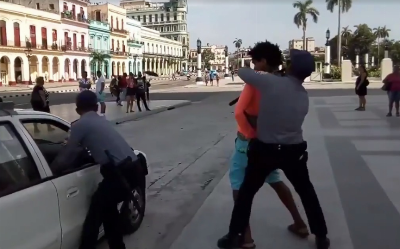UN Authority Figures
UN Commission on Crime Prevention and Criminal Justice: Cuba
 |
| Cuban police forcefully ended a hunger strike by young artists, academics, journalists and activists protesting government repression. Photo: Cuban police arresting a protester (Screenshot). Source: The Miami Herald, November 27, 2020 |
Mission of the Commission on Crime Prevention and Criminal Justice: "The Commission on Crime Prevention and Criminal Justice (CCPCJ) is the United Nations body of Member States responsible for setting out global strategy to prevent crime and promote stable criminal justice systems. The 40-member UN Commission on Crime Prevention and Criminal Justice formulates international policies and recommends activities in the field of crime control...The Commission offers nations a forum for exchanging expertise and information on matters of crime prevention and criminal justice and to determine strategies and priorities for combating crime at the global level....Priority areas mandated by the [Economic and Social] Council when it established the Commission in 1992 are: international action to combat national and transnational crime...and improving the efficiency and fairness of criminal justice administration systems." (Commission on Crime Prevention and Criminal Justice website)
Term of office: 2022-2024
Cuba's Record on Crime Prevention and Criminal Justice:
"Significant human rights issues included: unlawful or arbitrary killings, including extrajudicial killings, by the government; forced disappearance by the government; torture and cruel, inhuman, and degrading treatment of political dissidents, detainees, and prisoners by security forces; harsh and life-threatening prison conditions; arbitrary arrests and detentions; political prisoners; significant problems with the independence of the judiciary;... Government officials, at the direction of their superiors, committed most human rights abuses. As a matter of policy, officials failed to investigate or prosecute those who committed these abuses. Impunity for the perpetrators remained widespread... There were confirmed reports of long-term disappearances by or on behalf of government authorities. There were multiple reports of detained activists whose whereabouts were unknown for days or weeks because the government did not register these detentions, many of which occurred at unregistered sites... There were recurring reports that members of the security forces and their agents harassed, intimidated, and physically assaulted human rights and prodemocracy advocates, political dissidents, and peaceful demonstrators, and that they did so with impunity. Some detainees and prisoners endured physical abuse by prison officials or other inmates at the instigation of guards. Although the law prohibits coercion during investigative interrogations, police and security forces at times used aggressive and physically abusive tactics, threats, and harassment during questioning. Detainees reported officers intimidated them with threats of longterm detention, loss of child-custody rights, denial of permission to depart the country, and other punishments. State security officials frequently deployed to countries such as Venezuela and Nicaragua, where they trained and supported other organizations in their use of repressive tactics and human rights abuses and sometimes participated in the abuses directly... Prison conditions were harsh and life threatening. There were reports that prison officials assaulted prisoners. Prisons were overcrowded, and facilities, sanitation, and medical care were deficient... Prison and detention cells reportedly lacked adequate water, sanitation, light, ventilation, and temperature control... There were reports that prison officials assaulted prisoners, but authorities did not investigate credible allegations of mistreatment. Prisoners reported government officials refused to accept or respond to complaints... Arbitrary arrests and short-term detentions increased and became a routine government method for controlling independent public expression and political activity. The government frequently detained activists arbitrarily without informing them of any charges against them and often denied them the ability to communicate with their relatives."
(U.S. State Department's Country Report on Human Rights Practices 2020, Cuba)
